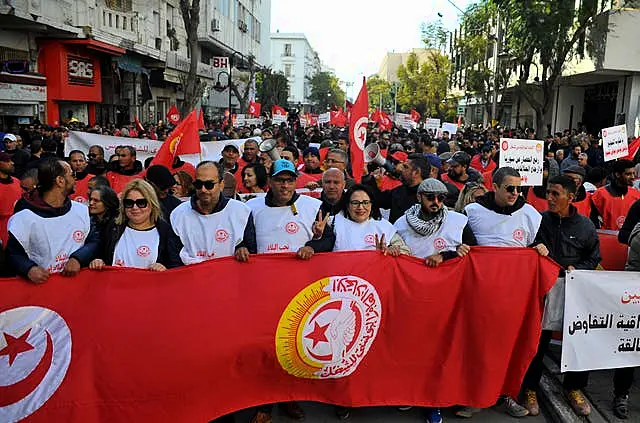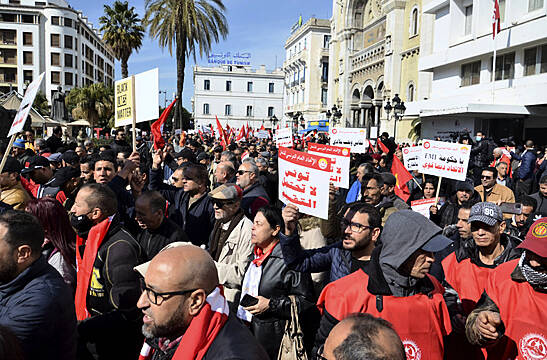Thousands of people marched through Tunisia’s capital on Saturday, protesting against an expanding crackdown on opposition voices and a proposed lifting of subsidies for food and other goods.
The march organised by Tunisia’s powerful central trade union was the latest challenge to Tunisian president Kais Saied, whose leadership is prompting growing international concern.
Since taking office in October 2019, Saied has consolidated his power, dismantled the country’s democratic gains and unleashed repression against migrants from elsewhere in Africa.
Marchers in Tunis chanted slogans against price increases and food shortages, the biggest concern for most Tunisians.

Talks with the International Monetary Fund on an agreement to help finance the government have stalled amid political tensions. The IMF has called for the lifting of some subsidies and other reforms.
The Tunisian General Labour Union, which is known by its French acronym UGTT, accuses the president of betraying promises made in negotiations over the reforms.
The UGTT was one of a ‘’quartet” of groups that won the 2015 Nobel Peace Prize for their work to save Tunisia’s budding democracy from collapsing into civil war.
Saied questioned the motives of the organisers of Saturday’s march and called the UGTT’s decision to invite foreign trade union leaders to the protest unacceptable.’

The general secretary of the European Trade Union Confederation was declared persona non grata in Tunisia after taking part in a demonstration last month. On Thursday, Tunisian border police turned away a Spanish trade union leader.
“Tunisia is not a farm, meadow or a land without a master. Whoever wants to demonstrate is free to do so, but he does not have to invite foreigners to participate,” Saied said on the eve of Saturday’s march.
UGTT secretary-general Noureddine Taboubi said he would have liked to hear a reassuring and unifying speech from the president, but instead heard only coded insults.
“We are supporters of social peace and our weapon is arguments. We are not promoters of violence and terrorism,” the union leader said.
Taboubi and other marchers expressed solidarity with government critics who are currently jailed. Tunisian police have arrested a string of figures from the Islamist opposition, the media, the judiciary and the business community.
Saied has grown increasingly autocratic since he suspended parliament in 2021, a move that many Tunisians welcomed at the time as an effort to end political deadlock that had worsened economic and social tensions.
Since then, Tunisia’s financial troubles have worsened, and the country’s legacy as the only democracy to emerge from the Arab Spring uprisings is in tatters.







